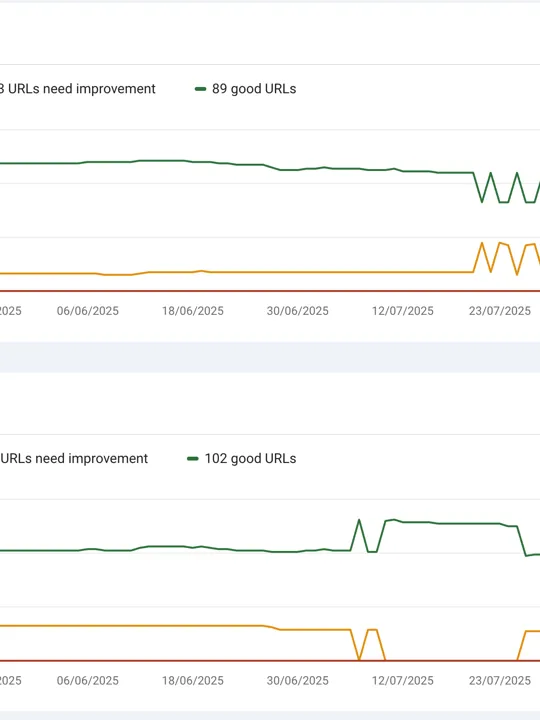What is Technical SEO?
When we talk about SEO (Search Engine Optimisation), what we mean is, the practices behind how to get a website to rank higher on search engines - such as Google. No matter how much you know about SEO, it’s important to remember that it is never a one size fits all approach and combines three main areas that all work together:
- On-Page SEO: This is all about your content. Are your web pages, blog posts, and images optimised with the right keywords?
- Off-Page SEO: This focuses on building your website’s reputation through backlinks from other credible sites as well as encompassing elements of local SEO through listings and citations.
- Technical SEO: This is the backbone of your website. It ensures that search engines like Google can easily crawl, index, and rank your site as well as making sure that your website is a great experience for users.
While on-page SEO and off-page SEO focus on content and authority, technical SEO makes sure your website’s infrastructure is solid. Without it, even the best content won’t rank if search engines can’t properly read your website. That’s what we’re going to be discussing in a little more detail below - the ins and outs of technical SEO and how optimising it could greatly benefit your business.
Understanding Technical SEO
In simple terms, technical SEO is the process of optimising your website’s infrastructure to help search engines like Google crawl and index your site more effectively.
While on-page SEO focuses on the words, images, and headings that users see, and off-page SEO is about getting other sites to link to yours, technical SEO works behind the scenes and ensures that your website is:
- Fast
- Mobile-friendly (since most people browse on their phones)
- Secure
- Structured correctly (so search engines know what your site is about)
It’s all about making your website as easy as possible for both search engines and users to navigate. A well-optimised site will load quickly, function smoothly on all devices, and present information in a way that’s easy to understand for both people and search engines.
Why is Technical SEO Important?
Search engines prioritise easy-to-crawl sites
Google’s algorithms are designed to reward websites that are easy to navigate. If your site is slow, confusing, or full of errors, search engines will have a hard time understanding it, and that means lower rankings.
Technical errors can hurt your rankings
Broken links, slow loading times, and security issues can all lead to lower search visibility. A technically sound website helps search engines and improves user experience, which leads to better engagement and higher conversion rates.
Better user experience means more bookings
When your site is fast, mobile-friendly, and easy to navigate, users are more likely to stay longer, explore your site in more detail, and complete a booking. This reduces bounce rates, increases dwell time, and signals to search engines that your site is valuable. All of which contribute to better rankings.
Without proper technical SEO, search engines may struggle to crawl and index your site, meaning you could be missing out on potential customers who are actively looking for your business. Simply put, without technical SEO, search engines simply cannot find you.

Key Elements of Technical SEO
So now we know what technical SEO is and how it benefits your website, we’ll look in more detail at the key elements of technical SEO. Below, we’ll break down the most important aspects of technical SEO and how they impact your website’s performance.
Site Speed & Performance
A slow website is one of the fastest ways to lose visitors. In fact, studies show that 53% of users will leave a site if it takes longer than 3 seconds to load. Search engines know this, and they prioritise sites that load quickly as a result. So, the faster your site, the happier your users will be.
How to measure:
- Google PageSpeed Insights: This tool gives you a breakdown of your site’s speed and recommendations for improvement.
- GTmetrix: Offers detailed insights into what’s slowing your site down.
Tips to improve site speed:
- Compress images to reduce file size without sacrificing quality.
- Use a Content Delivery Network (CDN) to serve your site faster to users around the world.
- Minimise unnecessary code (like JavaScript and CSS) to streamline your website.
Mobile Friendliness
With over 60% of searches happening on mobile devices, Google has shifted to mobile-first indexing. This means your site’s mobile version is the primary version Google considers when ranking, not the desktop.
How to test:
- Use Google’s Mobile-Friendly Test tool to see how your site performs on mobile and make all the changes.
Tips to improve mobile-friendliness:
- Use responsive design so your site adjusts to different screen sizes.
- Simplify navigation for smaller screens: make buttons easy to tap and reduce clutter.
- Ensure fast loading on mobile by optimising images and code.
Site Architecture & Navigation
A clear, logical site structure helps users and search engines find what they’re looking for. Poor navigation confuses visitors and can also prevent Google from properly indexing your pages.
Best practices:
- Organise your site into clear categories and subcategories.
- Use internal linking to guide users (and search engines) to important pages.
- Keep URL structures clean and easy to read (e.g., yourwebsite.com/rooms/luxury-suite instead of yourwebsite.com/page?id=123).
XML Sitemaps & Robots.txt
These files tell search engines which pages to crawl and which to ignore. Without them, search engines might miss important pages or waste time on irrelevant content.
- XML Sitemaps: A roadmap of your site that helps Google find and index your pages.
- Robots.txt: A file that controls which pages search engines are allowed to crawl.
Best practices:
Regularly update your XML sitemap and submit it through Google Search Console.
Use robots.txt to block pages you don’t want indexed (like internal admin pages).
HTTPS & Website Security
Google prioritises secure websites. Having an SSL certificate (which gives you that little padlock icon in the browser) is a ranking factor. Plus, secure websites build trust with visitors, which is essential for online bookings.
How to check:
- Make sure your website starts with https:// and not http://.
Best practices:
- Always use SSL certificates to protect user data.
- Regularly update plugins and software to avoid security vulnerabilities.
Structured Data & Schema Markup
Structured data helps search engines understand your content better, leading to rich snippets in search results. For hospitality businesses in particular, this includes showing star ratings, pricing, or availability right in Google’s search results.
Examples of schema markup:
- Articles: Highlight blog content.
- Products/Services: Display room rates or amenities.
- Reviews: Show customer ratings directly in search results.
- Local business: Provide key business information
Canonical Tags & Duplicate Content
If you have multiple pages with similar content (like different versions of your room listings), Google might penalise you for duplicate content. Canonical tags tell search engines which version of a page is the "official" one to index.
Best practices:
- Use canonical tags to point to the preferred version of a page.
- Keep URL structures consistent to avoid duplication.
Crawling & Indexing Issues
If Google can’t crawl or index your site properly, your pages won’t show up in search results. Broken links, 404 errors, and redirect chains can all hurt your rankings.
How to monitor:
- Use Google Search Console to check for crawl errors, broken links, and indexing issues.
Best practices:
- Regularly audit your website for broken links and fix any errors.
- Avoid redirect chains (multiple redirects from one page to another).

Technical SEO Best Practices
- Keep your website updated: Regularly check for technical issues and fix them promptly.
- Prioritise site speed and mobile usability: These are non-negotiable for both users and search engines, so make sure you are always optimising these.
- Use secure HTTPS protocols: Protect your site and boost trust with visitors.
- Ensure proper indexing: Use sitemaps, robots.txt, and structured data to guide search engines.
- Regularly check for broken links: Fix errors to maintain a smooth user experience.
We can help
With over two decades of experience in the industry, we are undeniable advocates that great SEO starts with a solid technical foundation above all. Everything else comes after your technical backbone is in place. If SEO is something your business is considering, or your usual SEO practices are resulting in lacklustre results, get in touch and we can help you get to the bottom of what the problem might be.
Our SEO team are exceptionally skilled and can help you optimise your site to improve search rankings, boost user experience, and drive more direct bookings.
Our technical SEO services include:
- Website audits to identify and fix technical issues.
- Site speed optimisation to ensure fast loading times.
- Mobile usability improvements to make your site responsive and user-friendly.
- Secure HTTPS implementation to protect your guests and build trust.
- Structured data integration to help your listings stand out in search results.
Sound like something that could benefit your business? Get in touch today.